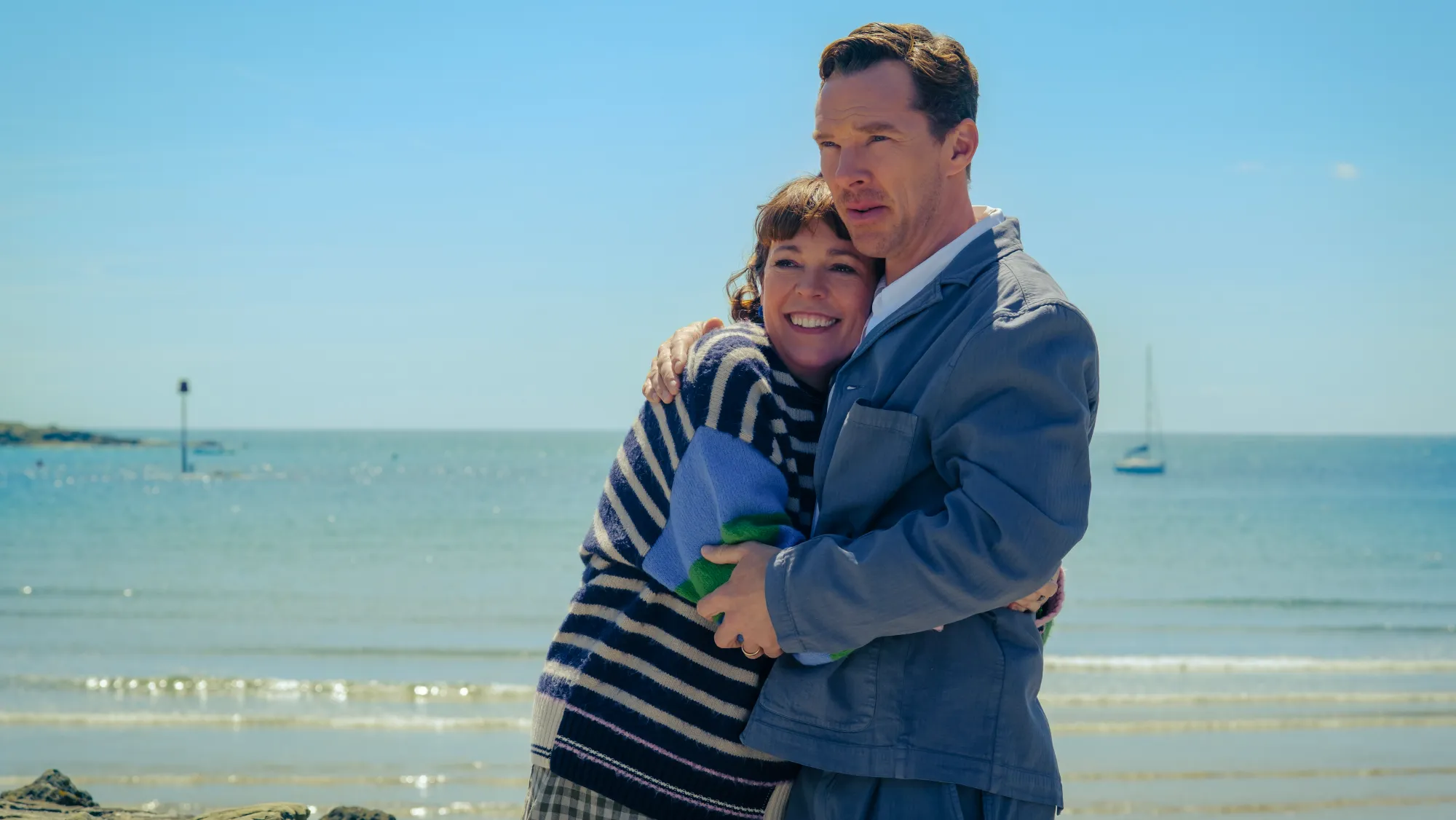
Jay Roach’s The Roses, released on August 29, 2025, is a modern reimagining of Warren Adler’s 1981 novel The War of the Roses, famously adapted in 1989 by Danny DeVito. This new version, starring Benedict Cumberbatch and Olivia Colman, trades the original’s scorched-earth satire for a more emotionally layered, darkly comic exploration of love, ambition, and the slow unraveling of a seemingly perfect marriage. While it doesn’t match the ferocity of its predecessor, The Roses finds its own rhythm in the tension between affection and resentment, offering a compelling portrait of two people who love each other deeply—and drive each other mad.
A Love Story with Cracks Beneath the Surface
The film opens with a meet-cute that’s almost too charming to be true. Theo Rose (Cumberbatch), a visionary architect frustrated by corporate compromise, wanders into a restaurant kitchen and meets Ivy (Colman), a gifted chef prepping for service. Their banter is witty, their chemistry electric, and their connection immediate. Within minutes, Ivy is planning a move to the U.S. to pursue her culinary dreams, and Theo impulsively decides to follow her.
Fast forward a decade: they’re married, have two children, and live in a stunning home that Theo designed. Ivy bakes elaborate desserts shaped like British monuments with the kids, while Theo works on a maritime museum meant to evoke the sensation of battling wind and waves. But when a freak storm destroys the museum and Ivy’s restaurant receives a glowing review, the balance of power shifts. Theo’s career crumbles just as Ivy’s soars, and the cracks in their marriage begin to widen.
Performances That Elevate the Material
Cumberbatch and Colman are the heart of the film, and their performances are nothing short of magnetic. Cumberbatch plays Theo with a mix of wounded pride and simmering insecurity, while Colman’s Ivy is radiant, sharp, and increasingly exasperated. Their dynamic is rich with nuance—playful in the early scenes, then gradually more brittle and combative.
Even as their relationship deteriorates, the actors maintain a sense of underlying affection. This isn’t a couple that hates each other from the start; it’s one that slowly loses sight of the love that brought them together. Their verbal sparring is laced with sarcasm and wit, and the emotional outbursts feel earned rather than melodramatic.
Supporting performances add texture to the story. Andy Samberg and Kate McKinnon play Barry and Amy, friends whose own marriage is quietly unraveling. Jamie Demetriou and Zoë Chao appear as Rory and Sally, another couple caught in the crossfire. Ivy’s restaurant staff, including Sunita Mani and Ncuti Gatwa, provide comic relief and occasional insight. While some of these characters feel underdeveloped, they serve as mirrors to Theo and Ivy’s escalating conflict.
A Marriage in Reverse
Unlike the 1989 version, which dove headfirst into viciousness, The Roses takes its time. The first hour is filled with sniping and passive-aggressive exchanges, but the real toxicity doesn’t erupt until the final act. This slow build allows the audience to understand the emotional stakes and history behind the conflict. Theo and Ivy aren’t caricatures—they’re complex individuals grappling with disappointment, ego, and unmet expectations.
The screenplay by Tony McNamara (known for The Favourite and Poor Things) is sharp and sardonic, filled with biting one-liners and moments of uncomfortable honesty. The dialogue sings with tension, and Roach’s direction keeps the tone balanced between comedy and tragedy. There’s a sense that the film is always teetering on the edge—never fully committing to darkness, but never letting the audience relax either.
Visuals and Pacing
Visually, The Roses is polished and stylish. Florian Hoffmeister’s cinematography captures the opulence of Theo and Ivy’s world, from their sleek home to Ivy’s bustling restaurant. The contrast between their public success and private turmoil is reflected in the lighting and composition. Scenes in therapy offices, kitchens, and bedrooms are intimate and claustrophobic, emphasizing the emotional pressure cooker they inhabit.
The film’s pacing is brisk, clocking in at just 105 minutes. It moves efficiently through the stages of the relationship, never lingering too long on any one moment. While some viewers may wish for more depth in certain subplots—particularly the children’s arc or the friends’ perspectives—the tight runtime ensures that the central narrative remains focused.
Themes of Power, Identity, and Resentment
At its core, The Roses is a story about shifting power dynamics in a marriage. When Theo was the breadwinner, Ivy supported him quietly. Now that she’s the star, Theo struggles to find purpose and identity. The role reversal is handled with sensitivity, highlighting the emotional toll of ambition and the fragility of ego.
The film also explores how love can curdle into resentment when communication breaks down. Ivy feels unappreciated and overburdened, while Theo feels emasculated and excluded. Their inability to articulate these feelings leads to petty sabotage, emotional manipulation, and eventually, physical confrontation.
There’s a moment late in the film when Theo admits to feeling “sporadic, dizzying waves of hatred” toward Ivy. It’s a chilling line, delivered with quiet intensity, and it encapsulates the emotional complexity of their relationship. They love each other—but they also know exactly how to hurt each other.
Not Quite a Black Comedy
While The Roses flirts with the genre of black comedy, it never fully embraces it. The film is more emotionally grounded than its predecessor, and it avoids the gleeful nihilism that made The War of the Roses so memorable. This restraint is both a strength and a limitation. On one hand, it allows for more nuanced character development. On the other, it pulls back just when the story could benefit from a sharper edge.
Some critics have noted that the film’s likability dial is turned too high—that Roach is reluctant to make his leads truly monstrous. This may be true, but it also reflects a shift in storytelling sensibilities. In 2025, audiences are more interested in emotional truth than theatrical cruelty. The Roses walks a fine line, and while it doesn’t always hit the mark, it remains compelling throughout.
Final Verdict
The Roses is a well-crafted, emotionally resonant film that updates a classic story for a new generation. It’s not as savage or audacious as the 1989 version, but it offers a more introspective take on marital breakdown. With standout performances from Benedict Cumberbatch and Olivia Colman, a sharp script, and stylish direction, it’s a film that lingers in the mind long after the credits roll.
It may not be the definitive adaptation of Adler’s novel, but it’s a worthy one—funny, painful, and deeply human. In the end, The Roses reminds us that love and hate are often two sides of the same coin, and that the people closest to us are the ones who can wound us most exquisitely.


Leave a Reply